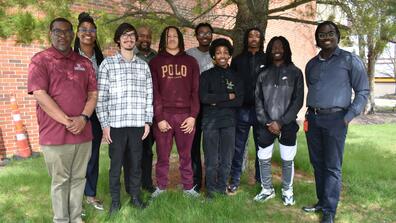Central State University addresses disparities and promotes inclusive mental healthcare

As first-year students make the exciting transition to Central State University, they may feel overwhelmed by the transition to college — living in a new community, meeting new people, learning about clubs and organizations, and more.
Central State University understands the challenges of navigating new experiences. It aims to provide a supportive environment that encourages students to pursue their passions and interests while also achieving their academic goals. With a wide range of extracurricular activities available, students can discover a fulfilling balance between their studies and personal growth.
To achieve their objectives, students need more than good advisors, high-quality courses, and knowledgeable professors. They also need comprehensive support to maintain their physical and mental health, including strategies for coping with the pressures of college life, knowing when to seek mental health services, and recognizing signs of depression and other conditions in their peers.
When a student is struggling, they can overcome challenges easier with the support of the entire campus community rallying around and uplifting them.
Central State is committed to overcoming the longstanding obstacles that Black, Indigenous, and people of color (BIPOC) communities face when seeking adequate mental health services. The University’s goal is to cultivate an inclusive environment where Marauders can thrive.
Achieving equity in behavioral mental health
The scope of the mental health access problem is all-encompassing and continues to grow. The Substance Abuse and Mental Health Services Administration (SAMHSA) estimates that in 2021, only 39% of Black or African American adults, 25% of Asian adults, and 36% of Hispanic/Latino adults with any mental illness received treatment, compared to 52% of non-Hispanic white adults.
In 2020, suicide was the leading cause of death among Asian Americans and Pacific Islanders ages 10-19 and the second-leading cause of death among those ages 20-34, according to SAMSHA.
The 2018 National Healthcare Quality and Disparities Report notes that disparities exist in the quality of mental healthcare provided to racial and ethnic minority populations. Research has shown that minority individuals are more likely to receive lower quality care, including less evidence-based treatments and inadequate follow-up care.
Central State University recognizes that achieving equity in behavioral mental health is a vital objective that demands addressing the racial imbalances within the field. The University remains dedicated to examining the significance of equity in racial behavioral mental health, identifying the crucial factors that contribute to disparities, and deliberating on strategies for promoting inclusive and equitable care.
According to Sonia Hunt, Ph.D., the director of Counseling Services at Central State, the stigma surrounding mental health problems in racial and ethnic minority communities causes people to delay seeking help and prefer informal support networks over professional care.
Rural communities are confronted with a notable obstacle when attempting to access adequate mental healthcare. This obstacle is primarily attributable to a scarcity of dependable and qualified providers in these regions.
“There is one mental health agency in (Xenia) and it’s five miles away,” Hunt said of proximity to the rural Central State campus. “Transportation is a barrier. For some of our students, insurance can be a barrier. Immediate access does not exist because the mental health agency has a waiting list.
“Where are the mental health providers? Are they in a community where there is a large concentration of people of color? We have to address that.”
Central State has addressed these concerns by offering access to mental health services 24 hours a day, seven days a week, and 365 days a year.
“We are present. We are where the students are. That is on purpose to develop the relational capacity, so students are comfortable coming to us,” Hunt said.
Those who overcome the access barrier do not always receive quality care, including when providers are not culturally responsive or informed. Individuals must be empowered to guide their own care, Hunt said.
Cultural factors include a lack of trust in the healthcare system that has sprouted from a history of abuse, such as the Tuskegee experiment, which aimed to study the progression of syphilis, a contagious venereal disease. Six hundred African American men in Macon County, Alabama, were recruited with the promise of free healthcare.
“In order to track the disease’s full progression, researchers provided no effective care as the men died, went blind or insane or experienced other severe health problems due to their untreated syphilis,” according to an article published by the History Channel.
In fact, there was already a cure for syphilis.
Leading the charge to better health
Central State’s Counseling Services team partners with student leaders to reduce stigma, including through NAMI (National Alliance on Mental Illness) on Campus. Central State was the nation's first Historically Black College or University (HBCU) to offer the student group in collaboration with NAMI and its state and local chapters.
“We’ve seen a 300% increase in students accessing our services between 2014 and 2023,” Hunt said. “The students have championed that cause by making sure we have mental health-related activities and programming on campus. We have designated mental health advocates — students, faculty, and staff — to help champion the mental wellness initiative. And it has worked.”
With almost 20 initiatives and training opportunities, Central State is leading the way toward better health for the leaders of tomorrow.
“We know that healing happens in relationships, especially for marginalized populations — LGBTQ students, students from the international community. We endeavor to create a campus that is embracing and informed,” Hunt said.
Another major barrier is for BIPOC individuals to find a provider who looks like them or has had similar experiences, if one is seeking that in their care.
Central State is working to address that with its focus on offering quality education to all students by focusing on removing barriers and stigma in BIPOC communities.BIPOC individuals are needed in the field of mental health services, and students may choose to major in social work, psychology, or sociology through the College of Humanities, Arts, and Social Sciences.
“Why aren’t they choosing these types of careers? Post-pandemic, people have been burnt out,” Hunt said. “This profession is already susceptible to burnout, and traditionally, we have not talked about self-care. Post-COVID, there has been a decrease in (providers) because the reality is we have our own battle wounds. Vicarious trauma is real. So, the question becomes, what do you do to fill your cup as a clinician?”
Achieving equity in behavioral mental health requires a comprehensive and multi-dimensional approach. By addressing access barriers, improving the quality of care, reducing stigma, and promoting culturally competent services, we can work toward eliminating disparities and ensuring that all individuals receive equitable care. Collaborative efforts among policymakers, mental health professionals, communities, and advocacy groups are crucial for creating a more inclusive and equitable mental health system.
Editor’s note: The United States marks each July as Minority Mental Health Awareness Month to bring awareness to the unique struggles that racial and ethnic minority communities face regarding mental illness in the United States. If you or someone you know is struggling or in a crisis, students, faculty, and staff can call 937-376-6338. For support for all others, call or text 988 or chat at 988lifeline.org.


